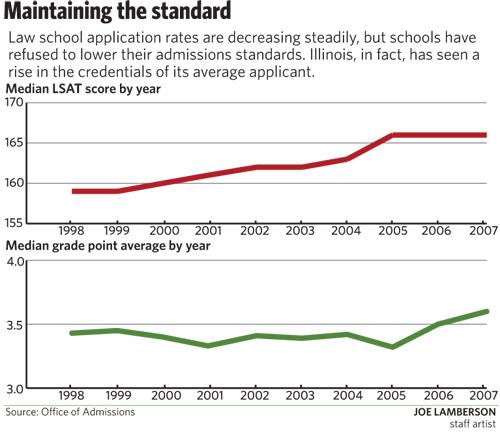Bar for law school admission still high

Erica Magda
November 15, 2007
Applications to law schools may be on the decline, but there is no reason for applying students to get excited.
Half of law schools have reported a decline in applicants over the past two years, but 79 percent say their admissions process is no less competitive, according to a survey conducted by Kaplan Test Prep and Admissions.
“Clearly, if fewer people are applying to law school, statistically speaking, your odds of getting into law school are better,” said Kaplan Pre-Law Programs Director Steve Marietti, although he said reductions and increases come and go.
“They are things to take advantage of while the number of students applying to law school is at a low point,” he added.
Marietti concluded that the overall caliber of law students may be getting better every year and said students looking to apply right now have a great opportunity.
Get The Daily Illini in your inbox!
“Knowing what the trends and movements are in law school will help students be better prepared for the application process,” he said.
Paul Pless, assistant dean for admissions and financial aid at the College of Law, said the number of applicants to the school has dropped over the last few years, however, application volume is up from this time last year.
Pless said with many students applying to six or seven law schools instead of three or four as in the past, law schools find themselves competing over the same people.
“Our yield, which is the number of people that attend over the number of people you admit, has gone down,” Pless said. “Most law schools have to admit more people to get the same number of students in their class, but we’re all admitting the same people, so that’s a problem.”
Across the country, 190 law schools participated in the survey, with 66 percent reporting that an applicant’s Law School Admission Test score is the most important of the admissions criteria.
A recent change in American Bar Association policy has significantly affected how law schools evaluate these scores, with 83 percent of schools now evaluating students on their single highest score instead of the average, up from 71 percent last year.
“It is a great opportunity for students who maybe didn’t do as well for any number of reasons,” Marietti said.
Pless agreed that many students will be helped by the change but said a disciplined student can do well without taking a class.
“The key is that you time yourself just like you would in the actual LSAT,” Pless said. “And the other key is that you’re disciplined enough to practice.”
Jillian Abraham, senior in LAS, took the LSAT twice.
She said she would have taken the LSAT once if most law schools would have taken her average test score.
“It was more of a relief and less stressful because there wasn’t as much pressure,” Abraham said. “(Taking the test twice) wouldn’t penalize you in any way. I thought I could improve, and I did go up.”
With 88,000 students applying for 46,000 spots at ABA-approved law schools last year, Marietti said it is important that students are on top of their law school admissions and LSAT preparation.
“There’s no reason to go into the exam not knowing what to expect,” he said of the $123 test. “This is an exam that rewards lots of advanced preparation and lots of advance knowledge walking in.”






